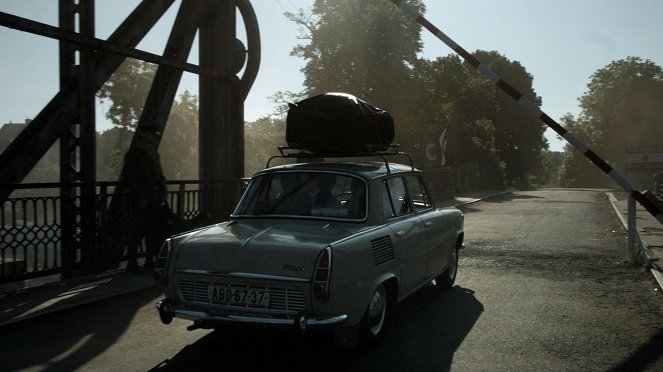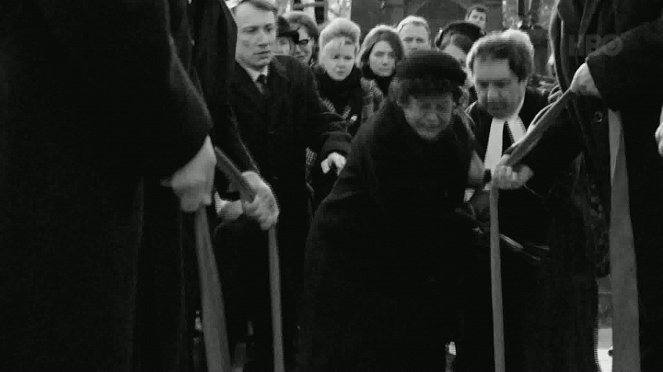Directed by:
Agnieszka HollandScreenplay:
Štěpán HulíkCast:
Táňa Pauhofová, Jaroslava Pokorná, Petr Stach, Igor Bareš, Vojtěch Kotek, Adrian Jastraban, Patrik Děrgel, Ivan Trojan, Jenovéfa Boková, Denny Ratajský (more)Plots(1)
Full of star actors, the drama Burning Bush is based on real events and real characters. Its main character is lawyer Dagmar Burešová (Tatiana Pauhofová), who decided to defend Jan Palach’s mother Libuše (Jaroslava Pokorná) and her brother Jiří (Petr Stach) in a seemingly hopeless court case. The cause of the libel suit filed by the family of the dead student was the scandalous accusation by Communist MP Vilém Nový (Martin Huba), who spoke out at a Communist party meeting in Česká Lípa and downplayed Palach’s sacrifice with some nonsense about “cold fire”. The husband of the courageous lawyer – both of them are forced to cope with the pressure of pro-Soviet collaborators – is played by Jan Budař. (HBO Europe)
(more)Videos (3)
Reviews (11)
200 minutes of exquisite filmmaking and beautiful sets only to learn that the communists were/are manipulative and heartless bastards? The first two episodes work perfectly well, script-wise and dramaturgically, and the story, spread among many characters, unfolds as smoothly and casually as the life of the Sultan of Brunei, but in the last part things get unfortunately relegated to a poorly built-up trial that gives too much space to politics and suppresses the real human emotions so abundantly present in the previous two episodes. Nevertheless, it’s an exceptional achievement in terms of direction, music and especially the actors, meeting almost world-class parameters for a strong biopic. This is the path that Czech cinema should take, and the international awards will certainly not be long in coming. 85%
()
Here the Lord's messenger appeared to him in a blazing fire from the middle of a thorn bush. Moses saw that the bush was on fire but was not consumed. [Exodus, 3.2] The masterful dramatization of events, the echoes of which still haunt us today. Štěpán Hulík chose the most difficult path, examining Palach's act from several angles. He seamlessly transitions from personal testimony to a conspiracy thriller and then to a legal drama, with each having its firmly anchored place in the plot. The way director Agnieszka Holland observes the whole situation is admirable because instead of serving a cheap epitaph of an extreme act, she offers an analytical probe into the era, which primarily calls the nation's conscience into question, a nation known for its very short memory. A multitude of excellent actors (I personally salute Jaroslava Pokorná), a multimillion-dollar budget squeezed to the last drop, and a cinematic event that reminds us that not all films are meant only to entertain us. I can't remember the last time something resonated so strongly within me.
()
The most interesting part is the first one when it's still about Palach and his fate. What follows in the remaining two parts is a somewhat tedious exposition that the communists were real bastards and managed to manipulate everything they wanted to. And so Palach's and Zajíc's actions feel really unnecessary. It's filmed excellently, and Pauhofová was perfectly cast. But it’s four hours long? That's a bit much, considering the central conflict is unwinnable.
()
Two of the most difficult tasks, namely avoiding thoughtless accusation and not falling into The Search for Lost Time, came out with flying colors. From getting to know individual characters, I went through the effort of at least partial understanding of the more negative ones until I was hanging on every word or gesture of Pauhofová and Pokorná, and just wished that this story could have a different ending than what history had determined for it. I'm just sorry how many motives Vojta Kotek takes on his shoulders in the student line. There are just too many of them, and what's worse - he can't handle a single one of them with dignity.
()
About Jan Palach’s deed. To achieve appropriate detachment from Palach’s deed in literary terms, we needed the view from outside of the Polish writer, Mariusz Szczygieł. And to achieve detachment in terms of cinema, we need the view from outside of the Polish director, Agnieszka Holland. And when we need... That’s partially true, but apart from the director it is a Czech film and finally thanks to Hulík we can say that we are now able to come to terms with historical skeletons in our closet (and we have lots of those!) like many, mainly the Germans, have been doing over the past years. No, it’s not quite filmed in a completely detached style, but her and there a little dose of pathos and pigeonholing characters works just fine; especially since they have time for this only in episode one where it is understandable. Unarguably the most important documentaries to have emerged in recent years and maybe not the very best (even though after the third “Normalization" episode I thought it probably was), but even so, full of powerful “unobtrusive" scenes and details which we certainly don’t see every day. P.S.: I’m glad that at last someone found the courage to give the powerhouse of the Theater in Dlouhá and one of the most talented actresses of her generation, Jaroslava Pokorná more than one line in a movie; and about time too.
()
Gallery (92)
Photo © Home Box Office (HBO) / Dušan Martinček, Kamil Rodinger



Ads